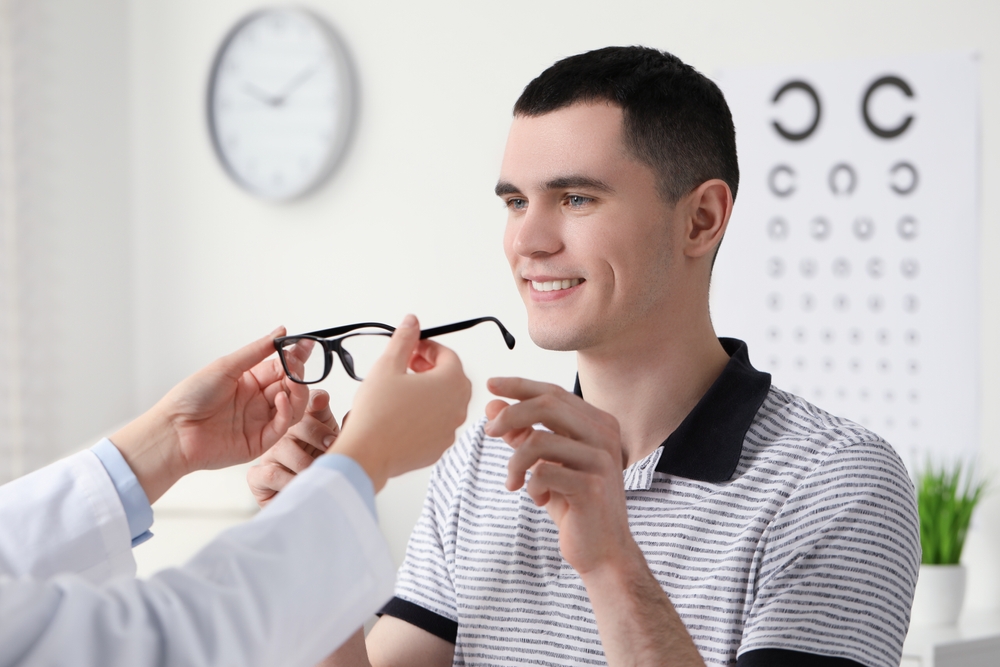
Good vision isn’t just about seeing clearly; it also depends on how well your eyes work together. Two common but often misunderstood conditions, myopia (nearsightedness) and binocular vision dysfunction (BVD), can significantly affect how we see and function in everyday life. While they are separate issues, they are more closely connected than many people realize, particularly in children and teens.
What Is Myopia?
Myopia, also known as nearsightedness, is a common vision condition in which objects up close appear clear, but distant objects look blurry. This happens when the eyeball is too long or the cornea has too much curvature, causing light to focus in front of the retina rather than directly on it.
In recent years, the prevalence of myopia has risen significantly, especially among children and adolescents. Prolonged near work (like screen time or reading), reduced outdoor activity, and genetic predisposition are all contributing factors.
What Is Binocular Vision Dysfunction?
Binocular Vision Dysfunction (BVD) occurs when the eyes have difficulty working together as a team. Even if each eye sees clearly on its own, a lack of coordination between the two can lead to a range of uncomfortable symptoms. These may include double vision, blurred vision, frequent headaches, eye strain, dizziness, balance problems, and trouble concentrating.
In a healthy visual system, the eyes move, focus, and align in unison, allowing the brain to process a single, clear image. When this coordination is disrupted, the resulting visual confusion puts added stress on the eyes and brain. This can make everyday activities more challenging and exhausting, especially when sustained focus is required.
The Link Between Myopia and Binocular Vision Dysfunction
Research has shown an association between myopia and binocular vision dysfunction, particularly in children and young adults. Myopia often requires the eyes to engage in prolonged near work, such as reading or screen use, which can place significant strain on the binocular visual system. This sustained visual demand may contribute to the development of conditions like convergence insufficiency or accommodative dysfunction, both forms of binocular vision issues.
Additionally, individuals with existing binocular vision problems may experience more rapid progression of myopia. When the eyes struggle to work together efficiently, the visual system can become stressed, potentially encouraging further elongation of the eye. This bidirectional relationship highlights the importance of evaluating both refractive error and binocular function during comprehensive eye exams, especially in children whose visual systems are still developing.
How Clarendon Vision Advanced EyeCare Can Help
At Clarendon Vision Advanced EyeCare, we specialize in diagnosing and managing visual conditions like myopia and binocular vision dysfunction. Our approach goes beyond standard eye exams to address how your eyes work together and how your vision impacts daily life.
We begin with a Functional Vision Exam, a comprehensive assessment that evaluates visual skills such as eye teaming, tracking, focusing, and depth perception. This exam helps us identify underlying binocular vision issues that may not be detected during a routine eye exam.
Based on the results, we offer personalized treatment plans that may include:
Myopia Management: For children and teens diagnosed with myopia, we offer evidence-based treatments to help slow its progression. Options may include soft multifocal contact lenses, orthokeratology (Ortho-K), and atropine eye drops. By managing myopia early, we can reduce the risk of future sight-threatening complications and support long-term visual health.
Specialty Prescription Lenses: These are designed to not only correct refractive errors like myopia but also to support proper visual function and relieve eye strain associated with binocular vision dysfunction.
Vision Therapy: A customized program of in-office and at-home exercises aimed at retraining the eyes and brain to work together more effectively. Vision therapy can significantly improve symptoms like double vision, headaches, and reading difficulties.
Our goal is to address both the clarity and functionality of your vision.
Get a Personalized Plan for Clear, Comfortable Vision
Understanding the connection between myopia and binocular vision dysfunction is essential for achieving clear, comfortable, and functional vision. Left unaddressed, these conditions can have long-term effects on learning, behavior, and quality of life. The good news is that with early detection and the right treatment, both myopia and BVD can be effectively managed.
If your child is experiencing symptoms of myopia or binocular vision dysfunction, schedule a consultation at Clarendon Vision Advanced EyeCare for a personalized treatment plan. Visit our office in Westmont, Illinois, or call (630) 323-7300 to book an appointment today.



